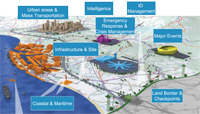|
Want to understand what’s coming in communications? Tero Pesonen looks at how we manage today and suggests we need to look beyond our boundaries When you think about the future of communications, there are three dimensions to consider. One is people, ourselves: what we are, our capabilities and our limitations. Another is, of course, technology. And the third is the environment. Let’s look at each of them. People: how do we communicate today, and why do we do it like that? Let’s jump back to the past, to maybe 200 years ago. In those days, the fastest way of communicating with somebody who didn’t live just next door or in the same village was by letter. The data highway of that time was the pony express. Communication then was very local. But the world was very small and local, for most people. If you wanted to conduct a dialogue by writing letters – let’s say, with someone in the US, from Europe – you would get to exchange information basically 12 times a year, because it takes a month for a letter to get to the other side. So the communications time concept was measured in weeks. RevolutionThen came revolution. The telephone was invented, and suddenly you had real-time communication. If the other person picked up the telephone, you could both talk. Yet you couldn’t do that everywhere – you could communicate only where telephones were. Because you couldn’t necessarily reach a specific person, communication time was still at least an hour. You didn’t expect to get an instant answer. But already the world had changed and this new communications tool was beyond the imagination of the pony express age. Then we come to the modern times of email and mobile phones – and suddenly, we have another revolution. Now you no longer need to know where other people are, you just need to know their code – their mobile phone number or email address. And off your message goes, free of geographical limitations. The time taken is slashed to a matter of minutes. Our society is becoming global; nevertheless, communication is still pretty much person-oriented and target-oriented. The next levelWhat does this mean to a human being? Typically, the next level of invention has always been science-fiction, and the step beyond that has been completely beyond imagination. For this reason, I believe it’s really important that we constantly ask ourselves what is actually the optimal way of communicating. If we consider our present society, our organizations, or anyone who was born pre-1995, we are thinking in hierarchical structures which were basically made post-World War. Now, I think it’s a worthwhile question – is that the best way? Or is it actually preventing progress? Today we must ask, how is tomorrow going to be? Of course, social media are already changing the world completely. My elder son, who is 12, is at his computer, playing an online game with people he doesn’t know, somewhere in the world. He’s talking with them on a headset, communicating with unknown people, which is already a strange concept when compared with the past. You wouldn’t have communicated with people you didn’t know. And on the side, he has Facebook open, seeing what’s going on among his circle – people he knows – and at the same time he has his mobile phone and a bunch of other stuff. So the world is open and private at the same time; it’s hierarchical and it’s flat at the same time. If we look ahead to 10-15 years’ time, when ubiquitous mobile broadband should be here, those who are now 10 will then be 25. They are the ones who matter. So how can we address them? It seems to me that we, as people, might be a blocking factor. Future technologiesSo next, let’s look at technology. I have picked up two examples from the best inventions of the year 2012 selected by Time magazine. First, the Project Glass by Google – spectacles that project an augmented reality display into your field of vision, direct from the Internet. Just imagine a police officer walking along the street, seeing constantly what’s happening inside this building, or this car – “it’s OK, it’s not stolen, but the tax hasn’t been paid” – all those things, directly in your vision. What, then, is the role of command and control? Is it a different role? What is the role of the person in the field in the first place, when you have all that information? Another one is Enable Talk Gloves – gloves with sensors. This project, by four Ukrainian students, is for interpreting sign language to text. Obviously, any of us can learn sign language, but not very many do. So when a person with the Enable Talk Gloves is doing sign language, you can view what it means on your mobile phone. In this way we can communicate.
|

